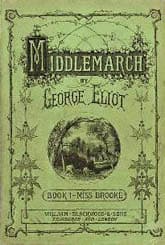Middlemarch
 1871 serial edition
1871 serial editionSubtitle
A Study of Provincial Life
First publication
1872 in eight volumes
Literary form
Novel
Genres
Literary
Writing language
English
Author's country
England
Length
Approx. 325,000 words
Notable lines
Who that cares much to know the history of man, and how the mysterious mixture behaves under the varying experiments of Time, has not dwelt, at least briefly, on the life of Saint Theresa, has not smiled with some gentleness at the thought of the little girl walking forth one morning hand-in-hand with her still smaller brother, to go and seek martyrdom in the country of the Moors?
— First lines, "Prelude"
Miss Brooke had that kind of beauty which seems to be thrown into relief by poor dress.
— First line, "Chapter I"
"And, of course, men know best about everything, except what women know better."
Sane people did what their neighbors did, so that if any lunatics were at large, one might know and avoid them.
Will not a tiny speck very close to our vision blot out the glory of the world, and leave only a margin by which we see the blot?
Marriage, which has been the bourne of so many narratives, is still a great beginning, as it was to Adam and Eve, who kept their honeymoon in Eden, but had their first little one among the thorns and thistles of the wilderness. It is still the beginning of the home epic — the gradual conquest or irremediable loss of that complete union which makes the advancing years a climax, and age the harvest of sweet memories in common
If we had a keen vision and feeling of all ordinary human life, it would be like hearing the grass grow and the squirrel's heart beat, and we should die of that roar which lies on the other side of silence.
"An accomplished woman almost always knows more than we men, though her knowledge is of a different sort. I am sure you could teach me a thousand things--as an exquisite bird could teach a bear if there were any common language between them. Happily, there is a common language between women and men, and so the bears can get taught."
Her full nature, like that river of which Cyrus broke the strength, spent itself in channels which had no great name on the earth. But the effect of her being on those around her was incalculably diffusive: for the growing good of the world is partly dependent on unhistoric acts; and that things are not so ill with you and me as they might have been, is half owing to the number who lived faithfully a hidden life, and rest in unvisited tombs.
— Last lines

